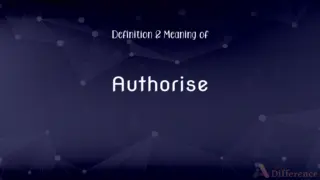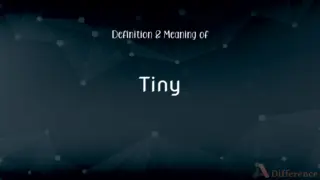Categorise Definition and Meaning
By Maham Liaqat & Fiza Rafique — Published on March 26, 2024
Categorise means to place into specific groups or classes based on shared characteristics. e.g., Scientists categorise animals into different species.
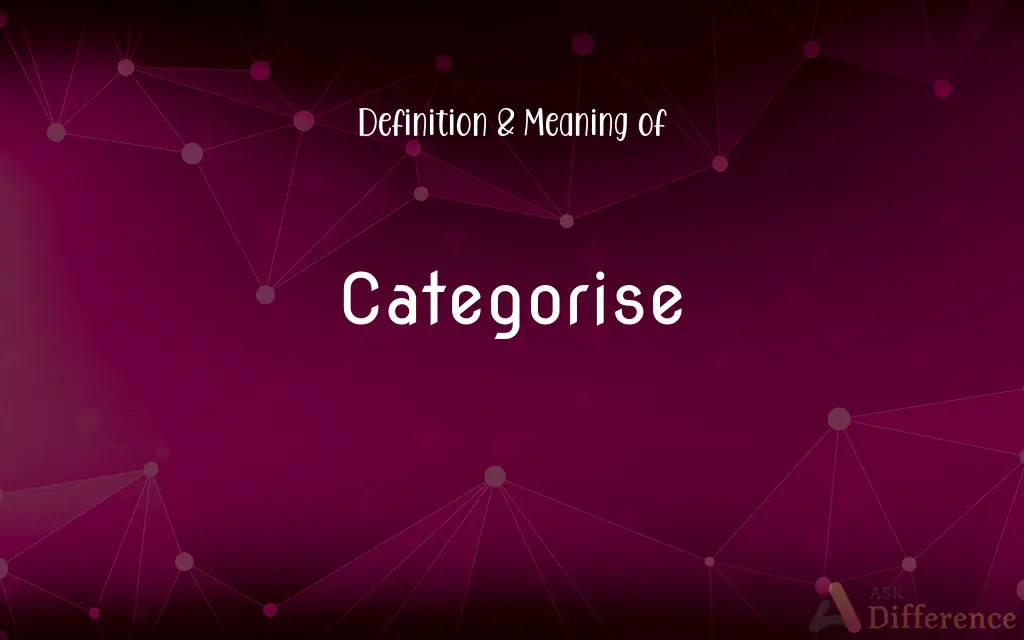
Table of Contents
Categorise Definitions
To classify something systematically.
We need to categorise these expenses for the report.
To arrange in categories or classes according to type.
The librarian categorises books by genre.
To arrange or classify in a systematic order.
The museum categorises its exhibits by historical period.
To identify by placing in a particular group.
The teacher categorises students based on their reading levels.
To assign to a particular category.
How would you categorise this piece of art?
To group according to shared qualities.
Foods are often categorised by their nutritional content.
To pigeonhole or label something in a specific way.
Critics tend to categorise films into 'good' or 'bad'.
To designate as belonging to a certain type.
How do we categorise this new technology?
To sort or organize by type or category.
The survey responses were categorised by age and gender.
To distribute into groups with common attributes.
The software can categorise emails automatically.
Standard spelling of categorize
Place into or assign to a category;
Children learn early on to categorize
Categorise Snonyms
Organize
To systematize or order in a coherent structure.
He organizes his tasks by priority level.
Classify
To arrange or organize by classes or categories.
Biologists classify organisms into a hierarchy of categories.
Sort
To arrange according to type, class, or category.
She sorted the laundry by color and fabric type.
Group
To place into sets based on common characteristics.
We group the data by region for analysis.
Arrange
To organize or order in a structured manner.
The librarian arranges the books alphabetically.
Divide
To separate into groups or categories.
The teacher divided the class into small reading groups.
Assign
To designate or allocate to a category or class.
Each task is assigned a priority level.
Label
To assign to a category, especially by tagging.
All products are labeled with their manufacturing dates.
Allocate
To distribute or assign according to a plan.
Resources were allocated among departments.
Segregate
To separate into different groups, usually by type.
Waste is segregated into recyclables and non-recyclables.
Categorise Idioms & Phrases
Categorise at a glance
To classify or sort something quickly based on an initial impression.
With experience, you can categorise at a glance which plants are edible.
Hard to categorise
Something that is difficult to place in a specific class or group.
Her music is unique and hard to categorise.
Categorise in detail
To classify with a high level of specificity and precision.
For this research, we need to categorise the data in detail.
Categorise by association
To classify based on relationships or similarities with other items.
In cognitive psychology, we learn how the brain categorises by association.
Categorise for convenience
To classify in a way that makes information easier to handle or understand.
We categorise these items for convenience, though some overlap exists.
Categorise under one roof
To group a wide range of items or subjects together in one place.
The museum categorises art from various eras under one roof.
Categorise beyond the surface
To classify not just by obvious characteristics but by deeper, less apparent ones.
A true connoisseur categorises wines beyond the surface notes.
Categorise on the fly
To classify or sort spontaneously or while in the process of doing something.
Chefs often have to categorise ingredients on the fly while cooking.
Categorise Example Sentences
Many people categorise books into fiction and non-fiction for simplicity.
The app helps users categorise their spending into different budgets.
The software can categorise emails as 'important' or 'spam'.
Teachers often categorise students by their learning styles to tailor instruction.
Environmentalists categorise waste into 'biodegradable' and 'non-biodegradable'.
Historians categorise eras by significant events and cultural trends.
Nutritionists categorise foods into groups like 'proteins', 'fats', and 'carbohydrates'.
Retailers categorise products to enhance the shopping experience.
It's important to categorise laboratory samples accurately for testing.
Photographers often categorise their work by themes and subjects.
Scientists categorise stars by their size, brightness, and temperature.
Gardeners categorise plants into 'annuals', 'biennials', and 'perennials'.
Researchers categorise species based on genetic characteristics.
Common Curiosities
Why is it called categorise?
The term "categorise" derives from the word "category," which originates from the Greek "katēgoria," meaning to accuse or predicate. It refers to the action of grouping or classifying items based on shared characteristics.
How do we divide categorise into syllables?
"Categorise" is divided into syllables as "cat-e-go-rise."
How many syllables are in categorise?
There are four syllables in "categorise."
What is a stressed syllable in categorise?
The stressed syllable in "categorise" is the first syllable, "cat."
How is categorise used in a sentence?
"Categorise" is used to describe the action of grouping things based on shared traits, e.g., We need to categorise these documents by relevance.
What is the verb form of categorise?
"Categorise" itself is a verb. The forms include the base form "categorise," the past tense "categorised," and the gerund or present participle "categorising."
What is the pronunciation of categorise?
"Categorise" is pronounced as /ˈkæt.ɪ.ɡə.raɪz/ in British English and /ˈkæt.ə.ɡə.raɪz/ in American English.
What is the second form of categorise?
The second form of "categorise" is "categorised," which is the simple past tense form.
What is another term for categorise?
Another term for "categorise" could be "classify" or "sort."
Is categorise a noun or adjective?
"Categorise" is a verb.
Is categorise a countable noun?
"Categorise" is not a noun; it is a verb, so it does not have a countable form.
What is the root word of categorise?
The root word of "categorise" is "category," which comes from the Greek word "katēgoria."
What is the first form of categorise?
The first form of "categorise" is the base form, "categorise."
What is the third form of categorise?
The third form of "categorise" is also "categorised," used as the past participle in perfect tenses.
What part of speech is categorise?
"Categorise" is a verb.
Is categorise a negative or positive word?
"Categorise" is neutral; its positive or negative connotation depends on the context in which it is used.
Is categorise a collective noun?
No, "categorise" is not a noun; it is a verb and does not have a collective form.
Is the word “categorise” a Direct object or an Indirect object?
"Categorise" is a verb, so it does not serve as a direct or indirect object, but it can take direct objects in sentences, e.g., "Please categorise these items."
Which determiner is used with categorise?
As a verb, "categorise" does not directly take a determiner, but its subject or object might, depending on the context.
What is the plural form of categorise?
As a verb, "categorise" does not have a plural form, but its usage varies with the subject (e.g., "I categorise," "we categorise").
Is the categorise term a metaphor?
The term "categorise" itself is not a metaphor, but it can be used metaphorically depending on the context.
Is the word categorise imperative?
"Categorise" can be used in the imperative mood as a command, e.g., "Categorise these files by urgency."
Which conjunction is used with categorise?
The conjunction used with "categorise" depends on the sentence structure, e.g., "and" in "We need to categorise and analyse the data."
What is the opposite of categorise?
The opposite of "categorise" could be "generalise" or "declassify."
Is categorise an abstract noun?
No, "categorise" is not a noun; it is a verb, so it cannot be an abstract noun.
Is categorise a vowel or consonant?
The word "categorise" starts with a consonant.
Is the word categorise a Gerund?
When used with -ing, as in "categorising," it can function as a gerund.
Which vowel is used before categorise?
The vowel used before "categorise" in a phrase depends on the context and the preceding word, not a specific rule for "categorise."
Which preposition is used with categorise?
Common prepositions used with "categorise" include "into" and "by," depending on the sentence, e.g., "categorise into types" or "categorise by characteristics."
Which article is used with categorise?
As a verb, "categorise" does not directly take an article, but an article may be used with its subject or object, depending on the context.
What is the singular form of categorise?
"Categorise" is already in its singular form as a verb.
Is categorise an adverb?
No, "categorise" is not an adverb; it's a verb.
Share Your Discovery
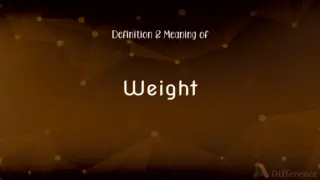
Previous Term
Weight Definition and Meaning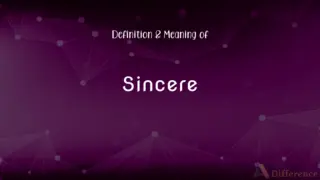
Next Term
Sincere Definition and MeaningAuthor Spotlight
Written by
Maham LiaqatCo-written by
Fiza RafiqueFiza Rafique is a skilled content writer at AskDifference.com, where she meticulously refines and enhances written pieces. Drawing from her vast editorial expertise, Fiza ensures clarity, accuracy, and precision in every article. Passionate about language, she continually seeks to elevate the quality of content for readers worldwide.







